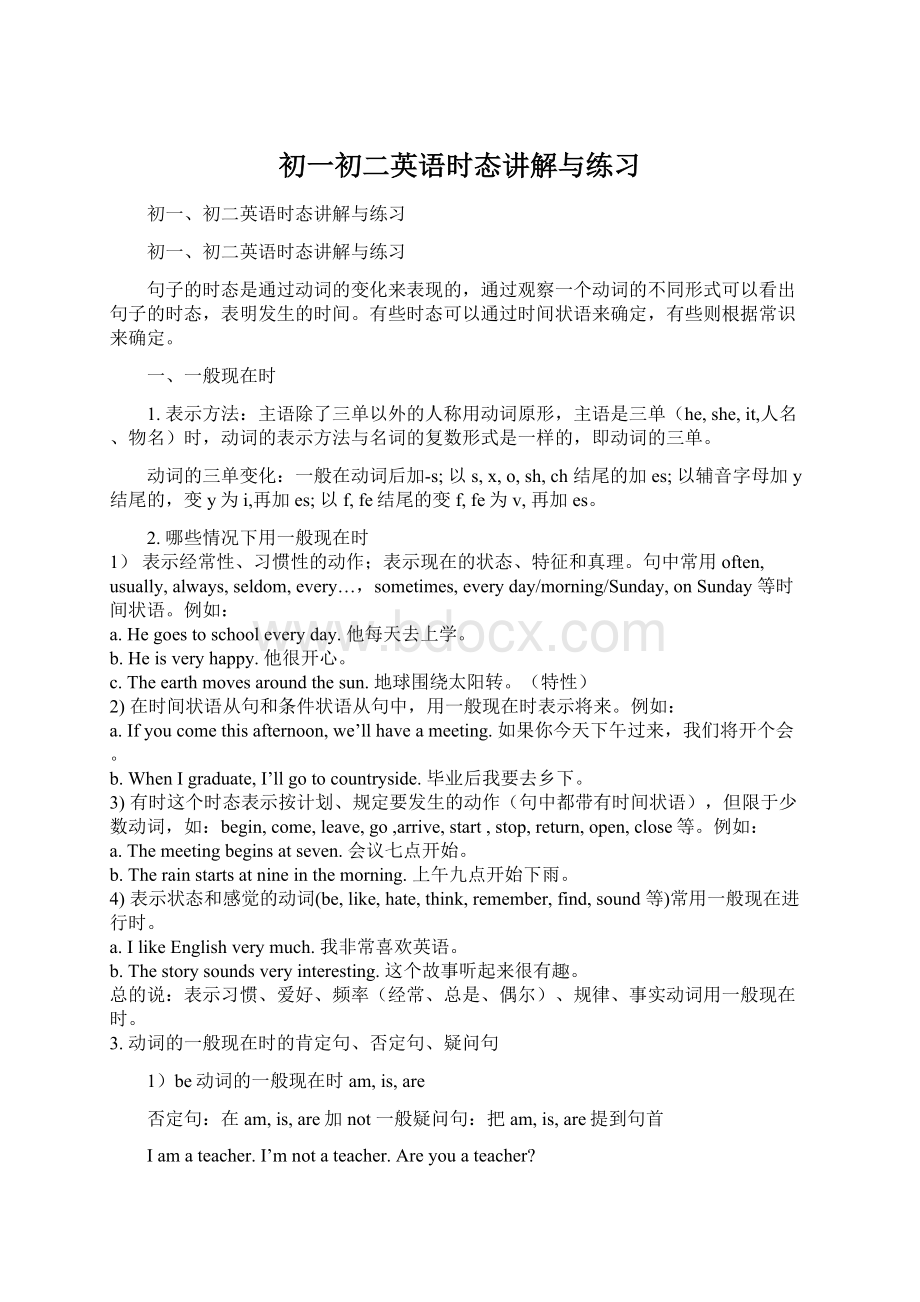初一初二英语时态讲解与练习.docx
《初一初二英语时态讲解与练习.docx》由会员分享,可在线阅读,更多相关《初一初二英语时态讲解与练习.docx(8页珍藏版)》请在冰豆网上搜索。

初一初二英语时态讲解与练习
初一、初二英语时态讲解与练习
初一、初二英语时态讲解与练习
句子的时态是通过动词的变化来表现的,通过观察一个动词的不同形式可以看出句子的时态,表明发生的时间。
有些时态可以通过时间状语来确定,有些则根据常识来确定。
一、一般现在时
1.表示方法:
主语除了三单以外的人称用动词原形,主语是三单(he,she,it,人名、物名)时,动词的表示方法与名词的复数形式是一样的,即动词的三单。
动词的三单变化:
一般在动词后加-s;以s,x,o,sh,ch结尾的加es;以辅音字母加y结尾的,变y为i,再加es;以f,fe结尾的变f,fe为v,再加es。
2.哪些情况下用一般现在时
1)表示经常性、习惯性的动作;表示现在的状态、特征和真理。
句中常用often,usually,always,seldom,every…,sometimes,everyday/morning/Sunday,onSunday等时间状语。
例如:
a.Hegoestoschooleveryday.他每天去上学。
b.Heisveryhappy.他很开心。
c.Theearthmovesaroundthesun.地球围绕太阳转。
(特性)
2)在时间状语从句和条件状语从句中,用一般现在时表示将来。
例如:
a.Ifyoucomethisafternoon,we’llhaveameeting.如果你今天下午过来,我们将开个会。
b.WhenIgraduate,I’llgotocountryside.毕业后我要去乡下。
3)有时这个时态表示按计划、规定要发生的动作(句中都带有时间状语),但限于少数动词,如:
begin,come,leave,go,arrive,start,stop,return,open,close等。
例如:
a.Themeetingbeginsatseven.会议七点开始。
b.Therainstartsatnineinthemorning.上午九点开始下雨。
4)表示状态和感觉的动词(be,like,hate,think,remember,find,sound等)常用一般现在进行时。
a.IlikeEnglishverymuch.我非常喜欢英语。
b.Thestorysoundsveryinteresting.这个故事听起来很有趣。
总的说:
表示习惯、爱好、频率(经常、总是、偶尔)、规律、事实动词用一般现在时。
3.动词的一般现在时的肯定句、否定句、疑问句
1)be动词的一般现在时am,is,are
否定句:
在am,is,are加not一般疑问句:
把am,is,are提到句首
Iamateacher.I’mnotateacher.Areyouateacher?
Sheisabeautifulgirl.Sheisn’tabeautiful.Issheabeautifulgirl?
Theyarecarefulstudents.Theyaren’tcarefulstudents.Aretheycarefulstudents?
2)实意动词的一般现在时
肯定句:
主语除了三单以外的人称用动词原形,主语是三单(he,she,it,人名、物名)时,动词的表示方法与名词的复数形式是一样的,即动词的三单。
否定句:
三单在动词原形前加doesn’t,其余人称加don’t
疑问句:
一般在句首加Do,三单在句首加Does后动词还原。
IlikeEnglish.Idon’tlikeEnglish.DoyoulikeEnglish?
MymotherteachesEnglish.Mymotherdoesn’tteachEnglish
DoesyourmotherteachEnglish?
二、一般过去时的用法
1.表示方法:
用动词的过去式表示
动词的过去式的表示方法:
be动词的过去式:
was,were
实意动词的过去式:
一般在动词后加-ed;以e结尾的加-d,以辅音字母加y结尾的,变y为i加ed,以重读闭音节结尾的双写末尾的辅音字母加ed.
特殊的动词的过去式如take-took等要记忆。
2.哪些情况下用一般过去时
1)在确定的过去时间里所发生的动作或存在的状态。
例如:
时间状语有:
yesterday,lastweek,anhourago,theotherday,in1982,justnow,once等。
例如:
Wheredidyougojustnow?
刚才你上哪儿去了?
2)表示在过去一段时间内,经常性或习惯性的动作。
例如:
WhenIwasachild,Ioftenplayedfootballinthestreet.
我是个孩子的时候,常在马路上踢足球。
WhenevertheBrownswentduringtheirvisit,theyweregivenawarmwelcome.
那时,布朗一家无论什么时候去,都受到热烈欢迎。
3)在时间状语从句中,由when引导从句的瞬间性动词用一般过去时,主句常用过去进行时。
IwaswatchingTVwhentherainstormsuddenlycame.(瞬间性动词)
Benwashelpinghismommakedinnerwhentherainbegantobeatheavilyagainstthewindows.(瞬间性动词)
4)注意:
情态动词用过去时表示现在,表示委婉语气。
例如:
could,would
Couldyoulendmeyourbike?
你的自行车,能借用一些吗?
重点学习一下,usedto/beusedto
usedto+do:
"过去常常"表示过去习惯性的动作或状态,但如今已不存在。
例如:
Motherusednottobesoforgetful.老妈过去没那么健忘。
Scarfusedtotakeawalk.斯卡夫过去常常散步。
beusedto+doing:
对……已感到习惯,或"习惯于",to是介词,后需加名词或动名词。
例如:
Heisusedtoavegetariandiet.
Scarfisusedtotakingawalk.斯卡夫现在已习惯于散步了。
典型例题
----Yourphonenumberagain?
I___quitecatchit.
----It's69568442.
A.didn'tB.couldn'tC.don'tD.can't
答案A.本句虽没有明确的时间状语,但从语意上看出,在听的时候没有听懂这个动作发生在过去,因此应用过去时。
3.一般过去时的否定句和疑问句
was,were的否定句直接在后面加not,疑问句把was,were提前。
实意动词的否定句在动词原形的前面加didn’t,疑问句在句首加Did后动词还原。
Shewasateacherthreeyearsago.
Shewasnotateacherthreeyearsago.
Wassheateacherthreeyearsago?
IwatchedTVyesterdayevening.
Ididn’twatchTVyesterdayevening.
DidyouwatchTVyesterdayevening?
三、一般将来时的用法
1.一般将来时表示将来的动作或状态。
其表达形式“will或shall+动词原形”;表示即将发生的或最近打算进行的事,或某种迹象表明将要发生某事,其表达形式“begoingto+动词原形”。
常用的时间状语tomorrow(morning/afternoon/evening);nextyear/month/week
a.Lookatthecloudsinthesky!
Itisgoingtorain.要下雨了。
(迹象)
b.Wearegoingtohaveameetingtoday.我们今天要开个会。
(打算)
C.WewillhaveameetingnextSunday.(将来)
2.在When,assoonas,if等引导的时间状语从句和条件状语从句中,时态是主将从现。
例如:
a.Ifyoucomethisafternoon,we’llhaveameeting.如果你今天下午过来,我们将开个会。
b.WhenIgraduate,I’llgotocountryside.毕业后我要去乡下。
C.IwillcallyouassoonasIarriveinBeijing.
四、现在进行时
1.表示方法:
am/is/are(助动词)+v-ing(现在分词)
否定句:
am/is/are+not+v-ing
疑问句:
把am/is/are提到句首
2.现在分词的构成
一般在动词后加-ing如:
work--working,sleep--sleeping,study--studying;
以e结尾的去e加ingtake--taking,make--making,dance--dancing;
重读闭音节的动词,要双写词尾字母,再加-ingcut-----cuttingput-----puttingbegin------beginning
以-ie结尾的动词,把变成y再加-inglie-----lyingtie-----tyingdie-----dying
3.现在进行时的用法
1)现在或当前一段时间内正在进行或发生的动作,常用的时间状语now,其它词如:
look,listen等。
Sheiswateringtheflowers.
Aretheyworkingnow?
Theyarelisteningtotheteacher.
2)always用在现在进行时中,表示表扬、批评、抱怨、责备等口吻。
Theyarealwayscomparingthemwithotherchildren.
Heisalwayshelpingotherswhentheyareintrouble.
3)有些动词即趋向性动词用现在进行时表示将来。
这些动词是:
come,go,leave,plan,等。
Iamleavingtomorrow.
IamgoingtoSingaporenextweek.
五、过去进行时
1.表示方法:
was/were(助动词)+v-ing
否定句:
was/were+not+v-ing
疑问句:
把was/were提到句首
1.过去某一时刻或某一段正在进行的动作,常用的时间状语histimeyesterday,atteno'clockyesterday,atthattime,whenhecameback等。
.Wewerereadinginclassthistimeyesterday
2.用于when,while引导的时间状语从句中
.Iwasdrawingapicturewhentheteachercamein.
Aron’sarmwascaughtundera2000-kilorockthatfellonhimwhenhewasclimbingbyhimselfinthemountains.(延续性动词)
Whileyouweresleeping,IcalledJennyandshehelpedme.
Ben’sdadwasputtingpiecesofwoodoverthewindowswhilehismomwasmakingsuretheflashlightsandradiowereworking.
六、现在完成时
1.现在完成时的表示方法:
have/has(助动词)+动词的过去分词
否定句:
have/has(助动词)+not+动词的过去分词
疑问句:
把have/has提到句首。
2.动词的过去分词的构成方法
一般的和动词的过去式的变化是一样的,特殊的需要记忆。
1.过去发生或已经完成的某一动作对现在造成的影响或结果,常用的副词或时间状语already, just, before ,never,ever,forthreeyears,since1990,thesedays
2.表示过去已经开始并持续到现在的动作或状态
I'vealreadypostedtheletter.
Wehaveknowneachotherfortenyears.
Theylivedheresince1997.
HaveyoueverbeentoBeijing?
2.havebeento与havegoneto的区别
havebeento表示去了某地已经回来了,havegoneto表示去了某地还没有回来
I’mverytiredbecauseIhavejustbeentoLondon.
--WhereisMissSmith?
--Shehasgonetothelibrary.
练习
一、用所给词的适当形式填空:
1.He__________swimmingintherivereverydayinsummer.(go)
2.It________youareright.(seem)
3.Look,thechildren_________basketballontheplayground.(play)
4.He_______totheradiowhenIcamein,(listen)
5.Itisverycold.Ithinkit__________.(rain)
6.—Ineedsomepaper.
—I__________someforyou.(bring)
7.Ican’tfindmypen.Who________it?
(take)
8.I__________mybike,soIhavetowalktoschool.(lose)
9.He_______downandbegantoreadhisnewspaper.(sit)
10.I__________withyouifIhavetime.(go)
11.Wewillgotothecinemaifit_______tomorrow.(rain)
12.Iwilltellherthenewswhenshe_______toseemenextweek.(come)
14.Iwilltellherthenewswhenshe_______toseemenextweek.(come)
15.“When______you_________thecar?
”“In1998.”(buy)
16.We_____goodfriendssincewemetatschool.(be)
17.What_______you_________atfiveyesterdayafternoon?
(do)
18.Thebikeisnice.Howmuch________it_________?
(cost)
二、选择最佳答案填空
()1.We’llgoswimmingiftheweather________finetomorrow.
A.isB.wasC.willbeD.isgoingtobe
()2.It________fiveyearssincehehasleftforBeijing.
A.wasB.havebeenC.isD.isgoingtobe
()3.Pleasedon’tleavetheofficeuntilyourfriend______back.
A.cameB.comesC.havecomeD.willcome
()4.Iwilltellhimassoonashe_____back
A.comeB.comesC.willcomeD.came
()5.Mary_____onshoeswhenshe____them.
A.tries…buysB.tries…buiesC.trys…buysD.trys…buies
()6.Listen!
Someone_________inthenextroom.
A.criedB.cryingC.iscryingD.hascried
()7.Youmusttellhimthenewsassoonasyouhim.
A.seeB.seesC.willseeD.isseeing
()8.We________totheGreatWallseveraltimes.
A.goB.weregoingC.havegoneD.havebeen
()9.Asshe________thenewspaper,Granny___________asleep.
A.read,wasfallingB.fellC.wasreading,wasfallingD.read,fell
()10.Heusually_____TVonSundayevening.
A.watchB.watchesC.watchingD.iswatching
()11.We'llgotoplaywithsnowifit______tomorrow.
A.snowB.snowsC.willsnowD.snowed
() 12.TheYoungPioneer_____waterfortheoldmaneveryday.
A.carryB.bringC.takesD.carries
() 13.Someare______intheriverandsomeare______games.
A.swimming…playingB.swimming…plaiing
C.swimming…IplayingD.swimming…plaing
()14.Look!
Theboystudentsare_____footballwhilethegirlsare_____.
A.playing…danceB.playing…dancing
C.play…dancingD.play…dance
() 15.He_____todohislessonsateighteveryevening.
A.isbeginningB.isbeginningC.beginD.begins
()16._____he_____onwellwithhisfriendsthisterm?
A.Does…getsB.Does…getC.Is…gettingD.Is…geting
()17.MrSmith_____shortstories,buthe____aTVplaythesedays.
A.iswriting…iswritingB.iswriting…writes
C.writes…iswritingD.writes…writes
()18.____you_____outforawalkaftersupper?
Yes,I______.
A.Did…went…wentB.Did…go…went
C.Did…went…didD.Did…go…did
()19._____Jack_____onwithhisworkor______tohavearest?
A.Did…went…stoppedB.Did…go…stop
C.Did…went…stopD.Did…go…stoppe
()20.He______somecookingatthattime,so_____me.
A.did…heardB.did…didn'thear
C.wasdoing…heardD.wasdoing…didn'thear
三、转换练习
1.Therearesomeapplesonthetree.(改为否定句)
There_________________________onthetree.
2.Lisahasacomputergame.(改为一般疑问句)
________Lisa________acomputergame?
3.Doestheboyoftenplaybasketball?
(作肯定和否定回答)
_________,__________________.________________________________________.
4.Hewantstogotothemovies.(改为否定句)
H